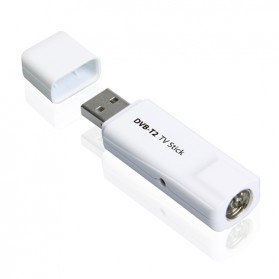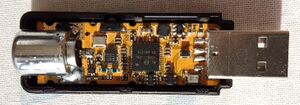Geniatech T230C
The Geniatech T230C (also branded as MyGica T230C (black case instead of a white one) or eyeTV T2 Hybrid (completely different case) targetting a Mac OS audience) is an evolution of Geniatech T230. Although it has the same external appearence, it uses different hardware, and is not supported by mainstream 2016-grade kernels. The MyGica-branded device can be found on websites that ship hardware directly from China.
Overview/Features
Components Used
The following components are used on the device
- USB interface: Cypress CY7C68013A-56LTXC
- Demodulator: Silicon Labs Si2168-D60
- Tuner: Silicon Labs Si2141-A10
Driver support
As of kernel 4.4, drivers are not included in the kernel (at least not in Raspbian 8). However, the driver dvb_usb_cxusb fully supports the device, and can be found in the Video4Linux project. It is possible to build it using CrazyCat's media_build tool.
The T230C appears as a 0572:c689 device
usb 1-1.3.3: New USB device found, idVendor=0572, idProduct=c689 usb 1-1.3.3: New USB device strings: Mfr=1, Product=2, SerialNumber=3 usb 1-1.3.3: Product: EyeTV Stick usb 1-1.3.3: Manufacturer: Geniatech usb 1-1.3.3: SerialNumber: 160421
To be confirmed: it looks like this device is better integrated into LibreElec system (see here how to use the Crazycat-CC driver pack).
Building the driver
The following procedure works on a 4.4.43-v7+ kernel and was tested on a Raspberry Pi. It should be pretty similar on other distros.
Run apt-get install raspberrypi-kernel-headers to get the correct headers (i.e. the headers corresponding to your exact current kernel build) into /lib/modules/<some folders about your current $(uname -r) kernel version>/. In my case, 2 folders were created: 4.4.43+ and 4.4.43-v7+. In case it does not download the right kernel version headers (there may be a mismatch between uname -r and the folder names in /lib/modules), you can grab the raspi sources by running:
# get the rpi-source tool wget https://raw.githubusercontent.com/notro/rpi-source/master/rpi-source chmod u+x rpi-source ./rpi-source --dest /somewhere/that/has/free/space # It does not create headers into /usr/src though or symlinks everywhere in /lib/modules, so: ln -s /somewhere/that/has/free/space/linux /usr/src/linux-headers-$(uname -r) ln -s /usr/src/linux-headers/$(uname -r) /lib/modules/$(uname -r)/build ln -s /usr/src/linux-headers/$(uname -r) /lib/modules/$(uname -r)/source ...and do the same with uname -r, but without the trailing -v7+ (eg 4.4.43+ if uname -r is 4.4.43-v7+)
Check that a correct .config file (corresponding to the exact current build of your kernel) is available at /lib/modules/$(uname -r)/build/.config It should normally have been fetched by rpi-source. If it was not the case, run modprobe configs, and the .config file that you want is available in the compressed file /proc/config.gz
Now we have the correct sources and .config file, we can fetch the driver sources and build it by using CrazyCat's media_build tool:
git clone https://bitbucket.org/CrazyCat/media_build cd media_build ./build --main-git
Be sure to have some space left, as it downloads a part of the kernel tree.
In case the build fails about frame_vector.c: No rule to make target '..../v4l/frame_vector.c' , comment the following lines in media_build/v4l/Makefile, so that they appear like this:
#ifeq ($(makefile-mm),1) #-include $(obj)/Makefile.mm #endif
Then you can install the drivers by running sudo make install
The process should have installed the correct corresponding firmwares into /lib/firmware. If it is not the case, grab and install the needed firmwares from https://bitbucket.org/CrazyCat/media_build/downloads/dvb-firmwares.tar.bz2.
Firmware
The Geniatech T230C requires these firmwares (available in https://bitbucket.org/CrazyCat/media_build/downloads/dvb-firmwares.tar.bz2):
- dvb-demod-si2168-d60-01.fw
- dvb-tuner-si2141-a10-01.fw
They must be copied in /lib/firmware
IR Remote Control
It has not been tested yet. Contributions are welcome.
Supported streams
This DVB-T stick supports every French DVB-T channel (i.e. both HDTV and SDTV, broadcast as MPEG4). They are succesfully processed through tvheadend.\\ It should support DVB-T2 (it is advertised on the package), although this has not been tested yet. Contributions are welcome.

